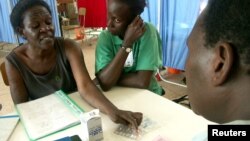KAMPALA —
Ugandan health workers are facing a dilemma. In June, the World Health Organization recommended giving HIV positive patients anti-retroviral treatment (ARVs) earlier to reduce the risk of spreading the disease. But for the past few months, many doctors have been struggling to provide the life-saving treatment to anyone at all.
Clinics outside the capital have been complaining of drug shortages, especially of HIV test kits and ARVs. John Barasa, who heads an ARV clinic in Busia in eastern Uganda, says the government is not been delivering all of the drugs his facility orders.
Of the 100 packs of ARVs the clinic requested in June, he says, only six were delivered. To make up for the shortages, Barasa has been stretching his supplies by giving patients only one or two weeks’ worth of drugs at a time.
"Some, who have to travel for hours to reach the clinic, have been running out of medicine," he says.
Elvis Basudde, head of the Positive Men’s Union, says he has been receiving complaints of drug shortages from clinics across the country. For HIV-positive Ugandans, he says, lack of access to ARVs could be disastrous.
"With us, there must be strict adherence to treatment," Basudde said. "So whenever we have such problems and issues, and somebody cannot be able to access medicine in good time, you can imagine the consequences. It could lead to drug resistance."
Yet Ugandan health advocates such as Margaret Happy, who works with the National Forum of People Living with HIV, say that there is no shortage of drugs in the country.
"At facility level, it is very severe," she said. "However, at national level the situation seems to be very different."
According to the Ministry of Health, Uganda has plenty of ARVs, enough to last until December. Ministry spokesperson Rukia Nakamatte says the problem lies with the clinics themselves, and with health workers who do not know how to use the government’s new Internet-based system for ordering medicine.
"The current shortage that we are experiencing in some facilities is due to increased orders that are being placed wrongly," Nakamatte said. "We have problems with some data entrants and bio-statisticians who are not able to enter the right data."
But in the clinics visited by Happy, this hasn't been the case.
"National level transfers blame to the local level. Yet the local level [has] evidence that clearly shows that they make the right quantification, and they make it timely," she said. "The problem is with delivery."
Happy says the new web-based order form is not always functional, and some of her fellow advocates also blame a new national supply system that prevents facilities from boosting each other’s supplies.
Both systems would be good ones if they worked, Happy said, adding that unless Uganda’s ARVs can make it out of the warehouses and into the clinics, they will not be saving anyone.
Clinics outside the capital have been complaining of drug shortages, especially of HIV test kits and ARVs. John Barasa, who heads an ARV clinic in Busia in eastern Uganda, says the government is not been delivering all of the drugs his facility orders.
Of the 100 packs of ARVs the clinic requested in June, he says, only six were delivered. To make up for the shortages, Barasa has been stretching his supplies by giving patients only one or two weeks’ worth of drugs at a time.
"Some, who have to travel for hours to reach the clinic, have been running out of medicine," he says.
Elvis Basudde, head of the Positive Men’s Union, says he has been receiving complaints of drug shortages from clinics across the country. For HIV-positive Ugandans, he says, lack of access to ARVs could be disastrous.
"With us, there must be strict adherence to treatment," Basudde said. "So whenever we have such problems and issues, and somebody cannot be able to access medicine in good time, you can imagine the consequences. It could lead to drug resistance."
Yet Ugandan health advocates such as Margaret Happy, who works with the National Forum of People Living with HIV, say that there is no shortage of drugs in the country.
"At facility level, it is very severe," she said. "However, at national level the situation seems to be very different."
According to the Ministry of Health, Uganda has plenty of ARVs, enough to last until December. Ministry spokesperson Rukia Nakamatte says the problem lies with the clinics themselves, and with health workers who do not know how to use the government’s new Internet-based system for ordering medicine.
"The current shortage that we are experiencing in some facilities is due to increased orders that are being placed wrongly," Nakamatte said. "We have problems with some data entrants and bio-statisticians who are not able to enter the right data."
But in the clinics visited by Happy, this hasn't been the case.
"National level transfers blame to the local level. Yet the local level [has] evidence that clearly shows that they make the right quantification, and they make it timely," she said. "The problem is with delivery."
Happy says the new web-based order form is not always functional, and some of her fellow advocates also blame a new national supply system that prevents facilities from boosting each other’s supplies.
Both systems would be good ones if they worked, Happy said, adding that unless Uganda’s ARVs can make it out of the warehouses and into the clinics, they will not be saving anyone.












